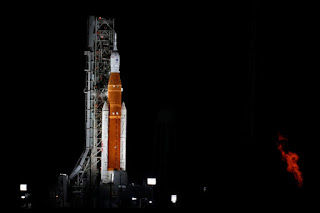NASA's Artemis I mission, scheduled to lift off Monday to carry an Orion capsule carrying three test dummies to the moon and back, has been scrubbed due to chronic fuel leaks and engine problems during final preparations.
The next flight window from Kennedy Space Center in Florida is Friday, if NASA decides the rocket was ready. NASA officials were scheduled to hold a briefing about the way forward today around noon.
"Safety always comes first," NASA tweeted. "Following today's #Artemis I launch attempt, @NASAArtemis teams are working on the #3 engine issue and expect to provide a briefing today."
NASA struggled to power the rocket with nearly 1 million gallons of hydrogen and oxygen because of a leak of highly explosive hydrogen, a problem that also flared up during testing last spring.
The massive Space Launch System rocket will become the agency's most powerful rocket when it finally takes off. A top priority will be testing Orion's new heat shield as it re-enters Earth's atmosphere at 25,000 mph. The capsule will have to survive a fiery descent in what is likely to be one of the fastest returns to date.
NASA's Artemis program is designed to take astronauts back to the moon sometime after 2025. This first test mission involves a return trip that will take about 42 days.
Vice President Kamala Harris reaffirms commitment to space exploration
Vice President Kamala Harris was among the thousands who gathered in South Florida for the launch. After the decision to postpone the flight, she was left excited.
"While we had hoped to see Artemis I launch today, this attempt provided valuable data as we tested the most powerful rocket in history," Harris tweeted. "Our commitment to the Artemis program remains strong and we will return to the Moon."
NASA: "You don't want to light the candle until it's ready to go"
The postponement was disappointing for the thousands who lined the coast to see the launch. Vice President Kamala Harris was among the VIPs present. Launch commentator Derrol Nail said engineers were still analyzing the issues and "we'll have to wait and see what comes out of their test data" before announcing a new launch date and time. NASA Administrator Bill Nelson said delays are part of the "business of space" and test flights, especially when dealing with machines as complicated as Artemis1.
"All those things have to work, and you don't want to light the candle until it's ready to go," he said.
NASA announces a postponement, no word yet on another attempt
NASA said launch director Charlie Blackwell-Thompson aborted the launch attempt around 8:34 a.m. The Space Launch System rocket and Orion spacecraft "remain in a safe and stable configuration," NASA said in a statement.
Launch controllers continued to evaluate why a bleed test to get the engines on the bottom of the base stage into the correct temperature range for liftoff was not successful, and they ran out of time due to the two-hour launch window. Engineers continued to collect data.






